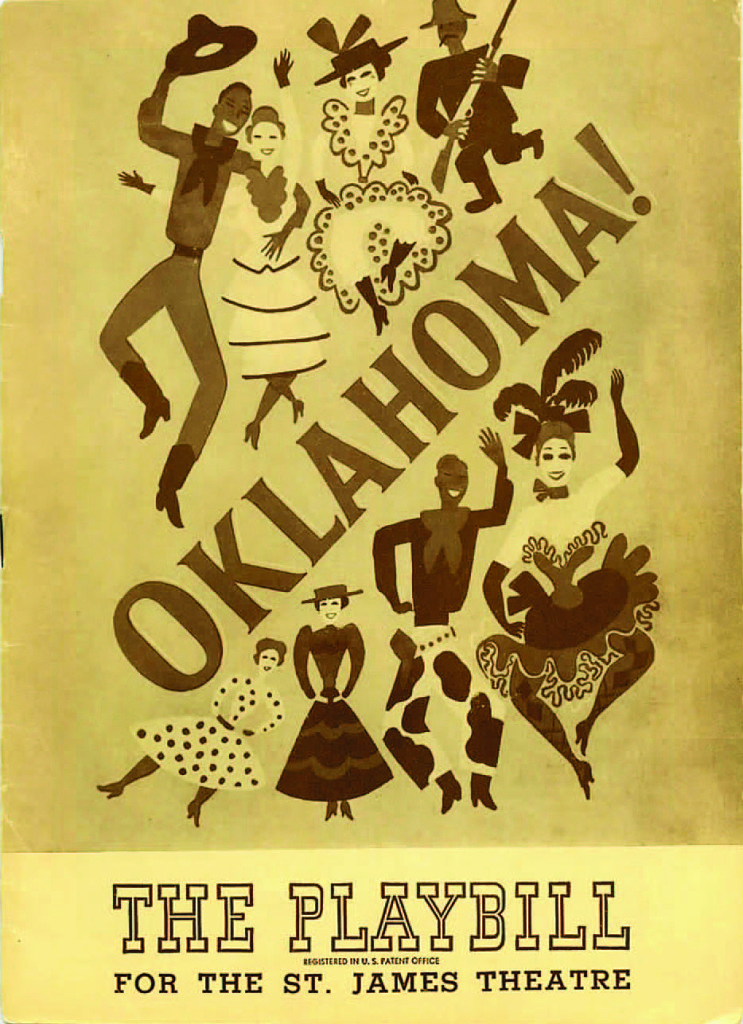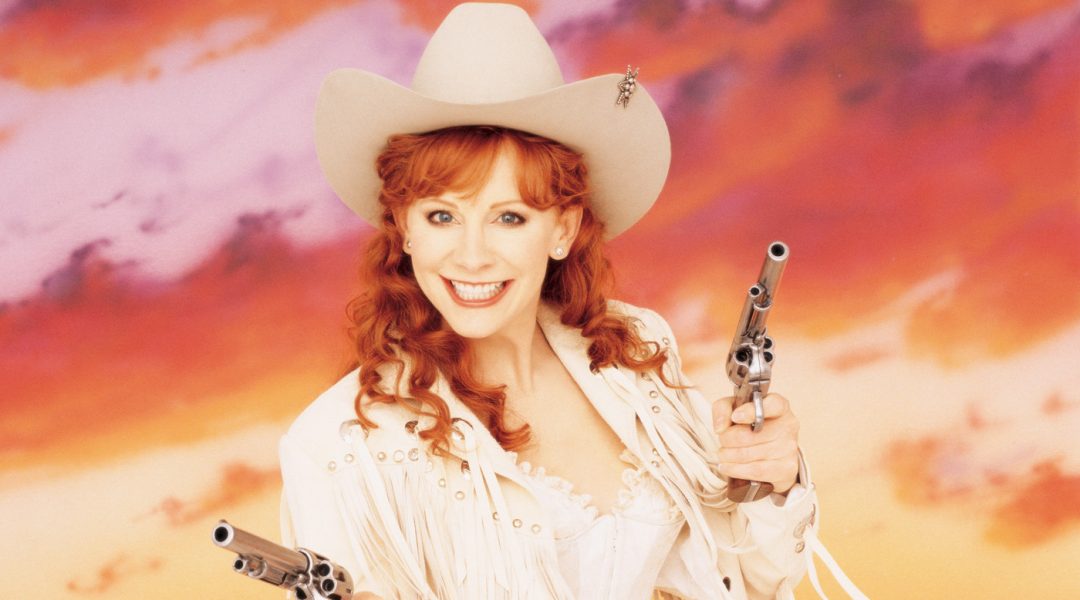New York City might seem a long way from the country, but Western-themed musicals have a long history on the Broadway stage.
Cowboys and Broadway musicals? They seem to exist in two different worlds. One is east, one is west; one is at home in the city, the other in the wide-open spaces; one is ropin’ and ridin’, the other is singin’ and dancin’.
And yet, both are true American originals, as embedded in our culture as baseball and Washington scandals. So it’s no wonder they have crossed paths often over the past 100 years. When the twain did meet, though, it wasn’t exactly a fusion — it was more like New York trading its top hat for a Stetson and trying to make “y’all” sound natural.
“Almost all of the western musicals were created by songwriters who rarely ventured west of the Hudson River,” says Bill Rudman, host of On the Aisle on Sirius XM’s Broadway channel and artistic director of The Musical Theater Project. “When Richard Rodgers and Oscar Hammerstein asked Irving Berlin to write the score for Annie Get Your Gun, Berlin hesitated because he didn’t think he could write what he called ‘hillbilly music.’ But now most are agreed that this was his greatest score for the theater. Alan Jay Lerner and Frederick Loewe didn’t know about the [California] Gold Rush when they started Paint Your Wagon, but they did a great deal of research before writing that show, because it was important to them that the songs sounded authentic. And they got there.”
What we think of today as the Broadway musical begins with Show Boat in 1927. There were cowboys in shows before then: The operetta Rio Rita was billed as “a tale of the Texas Rangers.” Similarly themed shows would follow with varying degrees of success. In George and Ira Gershwin’s Girl Crazy (1930), a New York playboy is banished to Custerville, Arizona, by a disapproving father and romances a mail carrier (future film star Ginger Rogers). And the legendary Al Jolson made his final Broadway appearance as a singing cowboy in Hold on to Your Hats (1940). But any survey of Western-themed musicals must begin in the state where the wind comes sweepin’ down the plain.

Oklahoma! (1943)
Next to Show Boat, which created the modern musical genre, Oklahoma! is arguably the most groundbreaking production in the evolution of musical theater. It was the first Rodgers & Hammerstein collaboration, establishing a partnership that was blessed from the beginning (Carousel, South Pacific, The King and I, The Sound of Music). The choreography by Agnes de Mille set a new standard for how characters expressed emotion solely through dance. Many of the songs (“People Will Say We’re in Love,” “The Surrey With the Fringe on Top,” the title song) have become standards.
The plot is a basic love triangle. Two ranch hands — handsome Curly and dark, brooding Jud Fry — both fall for the same girl, while Oklahoma awaits news of impending statehood. But from such simple roots, Oklahoma! went places Broadway had never been before, and audiences responded. It ran for more than 2,200 performances (at a time when 500 was deemed extraordinary) and became the first Broadway musical to play around the world. According to the documentary Broadway: The American Musical, as recently as 2004 there were still 600 new amateur and professional productions of the show launched every year.
“It takes off right at the top with ‘Oh, What a Beautiful Mornin’.’ The picture that it paints is so vivid, and everything about that song is beautiful writing,” Rudman says. “It opened during the dark days of World War II, a time we needed to be reminded of why we went to war and what our freedom really stood for. The lyrics in the title song — ‘We know we belong to the land, and the land we belong to is grand’ — that’s a huge and important statement in 1943.”
Tough act to follow? Indeed. But here are 10 more Broadway westerns that left their brand on the Great White Way.
Annie Get Your Gun (1946)
It was supposed to be a Jerome Kern musical, but the famed composer died before starting work on this fanciful biography of sharpshooter Annie Oakley. The producers, Rodgers & Hammerstein, asked Irving Berlin if he’d be willing to step in. Despite his initial reluctance, Berlin returned a few days later with five songs, including “Doin’ What Comes Naturally,” “You Can’t Get a Man With a Gun,” and “They Say It’s Wonderful.”
Ethel Merman was Broadway’s first Annie Oakley in a production that ran more than 1,100 performances. A 1999 revival (with a book that removed many of the less politically correct elements from the original show) featured Bernadette Peters, followed by Susan Lucci, Cheryl Ladd, and Reba McEntire, who earned gushing reviews in her New York stage debut.
“Ms. McEntire has ... managed to put a highly personal, proprietary stamp on a role that the ghost of Ethel Merman has always dominated, creating the most disarmingly unaffected Annie in years,” raved the not-easily-impressed New York Times. “She applies both her no-nonsense twang and balladeer’s throb to make familiar songs sound as fresh as this morning.” And if Broadway loved Reba, the feeling was apparently mutual: Four years later, she made an equally memorable impression in another iconic musical theater role, as Nellie Forbush in a Carnegie Hall concert performance of South Pacific.
Texas, Li’l Darlin’ (1949)
Another Western-themed musical boasted a clever score by Robert Emmett Dolan and lyricist Johnny Mercer. It lasted a respectable 293 performances, but this saga of an Air Force veteran running for the Texas Senate and falling for his opponent’s daughter is all but forgotten today.
Paint Your Wagon (1951)
Although it’s not as well-known as Lerner & Loewe’s landmark musicals, such as My Fair Lady and Camelot, Paint Your Wagon ran nearly 300 performances in its original run and was revived in New York’s City Center Encores! series earlier this year. It’s best known for introducing the song “They Call the Wind Maria” and for an unfortunate film adaptation, featuring such musical icons as Lee Marvin and Clint Eastwood.
Whoop-Up (1958)
While it remains a guilty pleasure among many Broadway aficionados, Whoop-Up was an unmitigated flop that closed after just 56 performances. Based on the book Stay Away, Joe about an Indian bullrider who returns to his Montana reservation, the musical shifted the focus to the girl he left behind, played by Susan Johnson.
Johnson is on every Broadway historian’s short list of outstanding musical stars who rarely found a worthy showcase for their talents. That’s one reason why the original cast recording is still popular among collectors. Songs include “Nobody Throw Those Bull,” “ ’Til the Big Fat Moon Falls Down,” and “The Best of What This Country’s Got,” which explains how all the things that make America great were stolen from Native Americans: “If all the facts were sifted, you would find everything was lifted.”
Destry Rides Again (1959)
“We don’t think about that show much anymore, but it’s delightful,” Rudman says about this musical adaptation of the 1939 film starring James Stewart and Marlene Dietrich. “Andy Griffith plays the sheriff, just before he ventured to Mayberry, and he’s fantastic in it.” None of the songs made much of an impression, however (Dietrich’s “The Boys in the Back Room” wasn’t used in the stage version), but Destry Rides Again lasted 472 performances and earned a Tony for Michael Kidd’s choreography.
Wildcat (1960)
Lucille Ball’s only Broadway excursion began the same year she left television after nine seasons as Lucy Ricardo. She played Wildcat Jackson, a girl in search of a big oil strike and willing to do just about anything to get it. Ball was at the height of her popularity, but the timing for the show could not have been worse: Still typecast from her iconic TV role, she was also still devastated from her divorce from Desi Arnaz. “The music director for that show, John Morris, told me she had so little confidence,” Rudman says. “He told her all she had to do was be ‘Lucy,’ but she couldn’t do it vocally.” The show closed after 171 performances.
The Unsinkable Molly Brown (1960)
Composer Meredith Willson’s follow-up to The Music Man is another wholesome tale of romanticized Americana. Tammy Grimes earned a Tony Award as the famed Colorado heroine who survived the silver crash, the gold rush, and the sinking of the Titanic. The film version featuring Debbie Reynolds also has its admirers, even if it cut the show’s best song, “Dolce Far Niente.”
The Best Little Whorehouse in Texas (1978)
“Don’t judge it by the movie,” Rudman cautions of this story about a famous Lone Star State brothel. “This was a terrific Tommy Tune show. He was from Texas, so he knew a lot about that world.” Many agree that the Burt Reynolds – Dolly Parton film didn’t recapture the magic of the stage version, but it’s OK to still be partial to Parton’s version of “Hard Candy Christmas.”
The Will Rogers Follies (1991)
Will Rogers may have been the first cowboy on Broadway, appearing as himself in the 1915 Florenz Ziegfeld production Midnight Frolic. His scripted comedy routines flopped, so he began scanning the newspaper and commenting humorously on current events, offering an everyman perspective on politicians and entrepreneurs like Henry Ford that audiences loved. Keith Carradine earned a Tony nomination in this lavishly staged Tommy Tune production, which ran for 981 performances. It is best remembered now for introducing the wonderful song “Never Met a Man I Didn’t Like” and for a high-spirited, intricate hand jive performed by a seated chorus line that often stopped the show.
Urban Cowboy (2003)
Urban Cowboy was one of the earlier attempts in the still-flourishing trend of adapting hit movies into Broadway musicals. Even with a score boosted by songs from Ronnie Dunn, Clint Black, and Shania Twain, it closed after just 60 performances. Perhaps they needed Debra Winger to ride that Gilley’s bull again.
What’s next? Possibly a musical about the life of Dolly Parton, now being written by Parton herself. The Country Music Hall of Famer, who has already had her name in a Playbill as the songwriter of the 2009 musical 9 to 5, has been working on the show for years.
If Parton’s life story does make it to Broadway, don’t be surprised if Tony Award winner Kristin Chenoweth plays Dolly. “I think Kristin Chenoweth is spectacular,” Parton told CNN. “We could just pad her up a little bit up top.”
From the November/December 2015 issue. Read our cover story profile of Oklahoma revival star Hugh Jackman.














